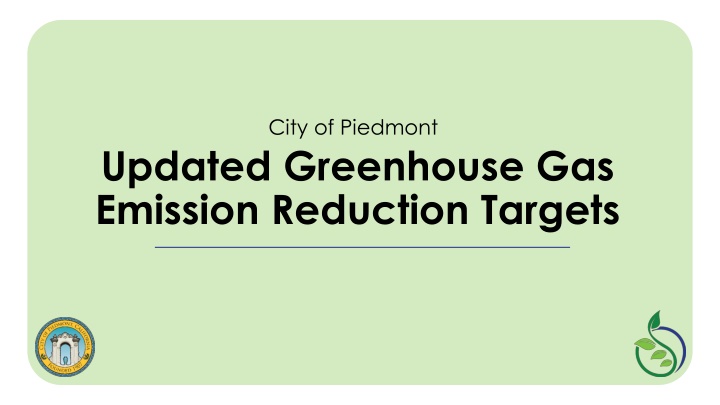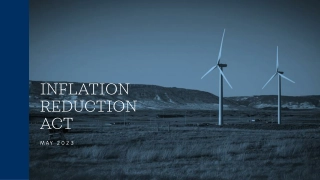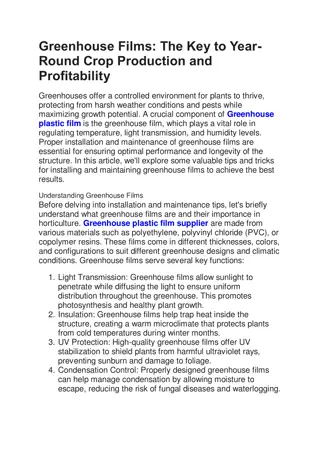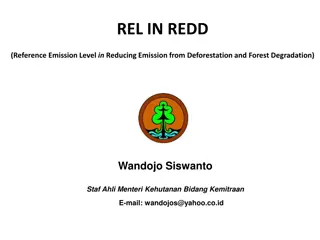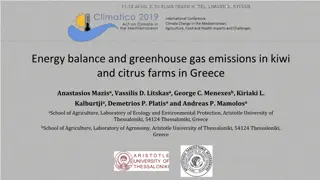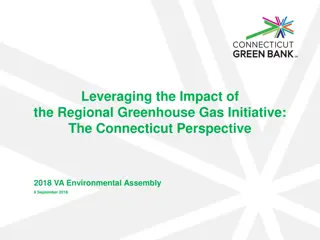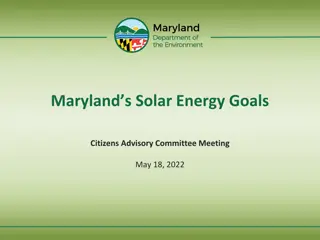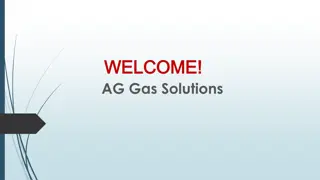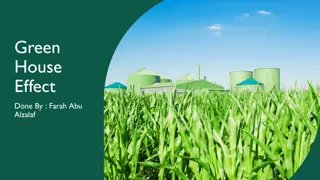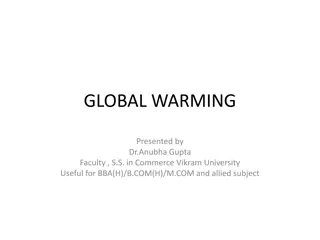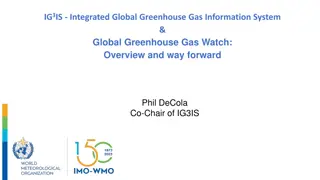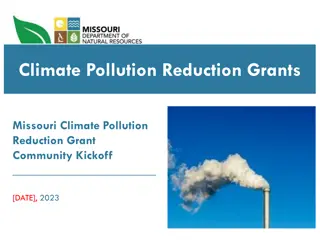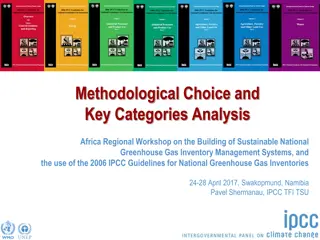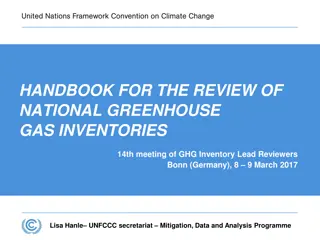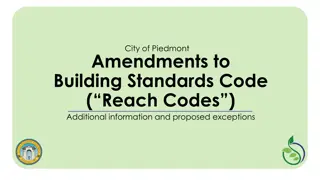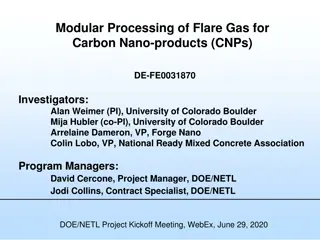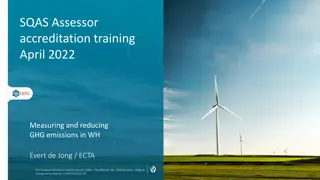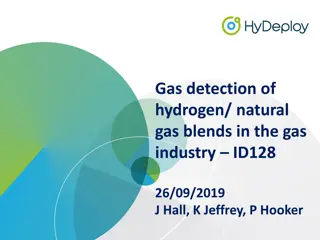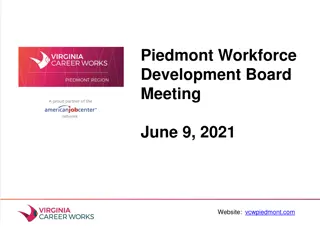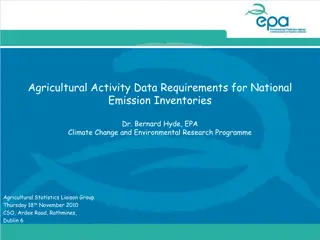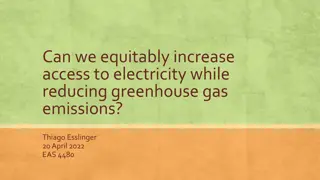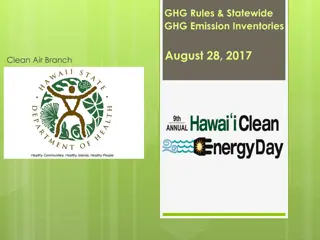Piedmont's Greenhouse Gas Emission Reduction Goals & Trends
Piedmont is updating its emission reduction targets to align with global, national, and state goals. Explore trends, proposed goals, and sector-specific reductions needed for a sustainable future.
Download Presentation

Please find below an Image/Link to download the presentation.
The content on the website is provided AS IS for your information and personal use only. It may not be sold, licensed, or shared on other websites without obtaining consent from the author.If you encounter any issues during the download, it is possible that the publisher has removed the file from their server.
You are allowed to download the files provided on this website for personal or commercial use, subject to the condition that they are used lawfully. All files are the property of their respective owners.
The content on the website is provided AS IS for your information and personal use only. It may not be sold, licensed, or shared on other websites without obtaining consent from the author.
E N D
Presentation Transcript
City of Piedmont Updated Greenhouse Gas Emission Reduction Targets
Climate Action Plan 2.0 Current Greenhouse Gas Emissions Goals Reduce in-territory greenhouse gas emissions*: 40% below 2005 levels by 2030 80% below 2005 levels by 2050 *CAP 2.0 goals no longer aligned with current state, federal, and global targets; staff are proposing updated targets in tonight s meeting
Piedmonts GHG Emissions Trends 60,000 48,818 50,000 46,901 39,456 37,02538,101 38,492 MTCO2e 40,000 34,340 34,19733,40232,357 29,291 30,000 20,000 9,761 10,000 0 2005 2010 2014 2015 2016 2017 2018 2019 2020 2021 2030 (goal) 2050 (goal)
Global, National, State, & Local Context Paris Agreement set goal of reducing emissions to keep global surface temperature rise in this century below 1.5 degrees Celsius* Biden Administration aims to achieve a 50-52% reduction from 2005 levels by 2030; net zero emissions no later than 2050 California aims to achieve net zero emissions no later than 2045 Locally, 9 cities in Alameda County have committed to net zero emissions by 2045 *To date, the release of anthropogenic GHG emissions is estimated to have caused the global surface temperature to increase approximately 1.1 degrees Celsius (1.8 degrees Fahrenheit) above pre-industrial levels. Source: Intergovernmental Panel on Climate Change. Sixth Assessment Report. Synthesis Report. 2023.
Proposed New Emission Reduction Goals 60,000 48,818 50,000 46,901 39,45638,492 37,02538,101 MTCO2e 40,000 34,340 34,19733,40232,357 30,000 24,409 20,000 10,000 0 0 2005 2010 2014 2015 2016 2017 2018 2019 2020 2021 2030 (goal) 2045 (goal)
Piedmonts GHG Emissions by Sector (Metric Tons of Carbon Dioxide Equivalent) and Reductions Needed to Meet New Proposed Goals 2030 Goal 2045 Goal 2005 2010 2015 2021 Buildings & Energy Use 25,573 24,974 19,176 15,551 12,786 0 Transportation 20,210 20,053 18,102 15,902 10,105 0 Solid Waste 2,620 1,454 1,128 276 1,309* 0 Water & Wastewater 415 420 86 142 207* 0 Fugitive Emissions -- -- -- 486 0 0 Total Emissions 48,818 46,901 38,492 32,357 24,409 0 *Solid waste and waste & wastewater sector emissions have already met 2030 goals based on the latest completed inventory for calendar year 2021.
2021 GHG Emissions Inventory Topline Since 2005 34% Municipal Activities 914 MTCO2e Since 2018 6% 2019 2020 5% 3% Residential & Commercial Activities 31,443 MTCO2e
Summary: Buildings: 49% Transportation: 48% Fugitive: 1.5% Solid Waste: 1% Water: <1% 2021 Community GHG Emissions Process & Fugitive Emissions, 1.5% Water and Wastewater, 0.5% Solid Waste, 1% Commercial Energy, 2% Residential Energy, 47% Transportation and Mobile Sources, 48%
Conclusions Piedmont is close to meeting its 2030 emissions reduction goal, but at the current pace it will not meet future goals without significant effort. Natural gas and transportation remain the primary sources of emissions, the levels of which are stagnant or increasing. Reductions must be centered on decarbonization efforts (e.g., shift to electric vehicles and electric appliances) in combination with lifestyle changes to address consumption.
Programs to Help Meet Emission Goals CAP Implementation Building Electrification Program EVs and Active Transportation Program Organics and Recycling Program Sustainability Outreach and Education
Building Electrification Ongoing Initiatives All-Electric Aquatic Facility Electrification Rebate Program Home Energy Assessment Policies Induction Cooktop Lending Program Municipal Energy Portfolio Audit Renewable Electricity Enrollment Renewable Energy Generation Reach Codes Future Initiatives Building Electrification Task Force Existing Buildings Electrification Strategy Solar/Battery Storage at Municipal Facilities Streamlined Solar Permitting
EVs and Active Transportation Ongoing Initiatives Installation of high priority bike- pedestrian improvements Municipal Fleet Electrification Assessment Municipal Fleet Charging Stations Public EV Charging Stations Retirement of gas and diesel- fueled vehicles and adopting electric vehicles Streamlined EV Charger Permitting Future Initiatives Exploring feasibility of a micromobility program Encouraging telecommuting policies Encouraging land use decisions that increase work-live and mixed zoning Increasing mode shifts to active and public transportation Photo Credit: EBCE
Organics, Recycling, and Consumption Ongoing Initiatives Free Compost Giveaway Program Implementation of Sustainable Purchasing Policy Installation of 3-series bins in parks and public spaces Installation of public drinking water stations Piedmont Evergreen event technical assistance Senate Bill 1383 implementation and participation in curbside organics collection services Future Initiatives Exploring the feasibility of a reusable food ware policy Encouraging creation of community gardens Partnering with PUSD to reduce emissions from consumption of goods/food
Outreach and Education Ongoing Initiatives Future Initiatives Exploring feasibility for a Community Resilience Hub Exploring feasibility for developing a Sustainable Parks Master Plan Launch of Youth Climate Ambassador Program Bike to Work Day Collaboration with PHS Green Club Collaboration with local community groups Continuing participation in Climate Corps Fellowship Program Development of Climate Communications Plan Earth Day/Month Events Monthly Climate Action e-newsletter Piedmont Community Climate Challenge Piedmont Post Climate Corner Photo Credit: Julie Reichle, Piedmont Exedra
Contact Alyssa Dykman Sustainability Program Manager adykman@piedmont.ca.gov Sophie Roberts Climate Action Fellow sroberts@piedmont.ca.gov
